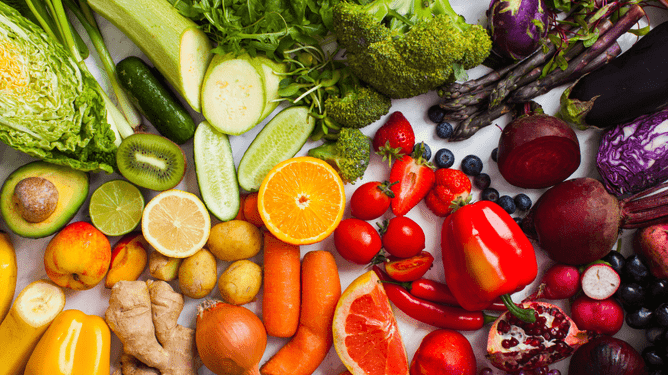Have you watched the recent Netflix series "You Are What You Eat" - a Stanford Medical study involving a total of 22 pairs of identical twins, which randomized one twin from each pair to either a vegan or omnivore diet? A number of health metrics were assessed over the short 8-week study, with positive results for the twins with the vegan diet. A plant-based diet can confer benefits such as a reduction in lower low-density lipoprotein cholesterol (LDL-C) levels, lowered insulin levels, a reduction in body weight, an increase in gut bacteria and the reduction of telomere loss.
A growing awareness of gut and heart health, longevity and ethical or environmental concerns have led to a shift to plant-based diets for many people. While these diets offer numerous health benefits, dentists are observing a trend that presents unique challenges. One of the emerging concerns is the increased risk of acid erosion of teeth, especially in individuals with fruit-rich plant-based diets. In this article, we'll explore the factors contributing to acid erosion in vegans and vegetarians and discuss strategies to mitigate its effects.
Understanding Acid Erosion:
Acid erosion, also known as dental erosion, is the gradual loss of tooth enamel caused by the acidic content of certain foods and beverages. Enamel is the protective outer layer of the tooth, and its erosion can lead to tooth sensitivity, discoloration, and increased risk of changes in appearance and function. While acidic foods and drinks can affect anyone's dental health, individuals following plant-based diets, particularly those rich in fruits, may be at higher risk due to the frequent consumption of acidic foods.
The Role of Fruit in Vegan and Vegetarian Diets:
Fruits are an essential component of vegan and vegetarian diets, providing vital nutrients, fiber, and antioxidants. However, many fruits contain natural acids, such as citric acid, ascorbic acid and malic acid, which can contribute to dental erosion. Additionally, the consumption of dried fruits, fruit juices, and smoothies – common staples in plant-based diets – can further exacerbate the acidic environment in the mouth.
Liquid Supplements, Boosters & Vitamin Products:
In addition to fruit consumption, another source of concern for acid erosion in individuals following plant-based diets is the frequent consumption of liquid supplements, boosters, and vitamin products. These products, often touted for their health benefits, commonly contain citric acid as a substrate to enhance flavor and preservation. While intended to provide essential nutrients, the acidic nature of these supplements can contribute to dental erosion when consumed regularly, especially when they are freeze dried powders or liquid drops combined with water, or added to beverages. Therefore, individuals incorporating these products into their plant-based diets should be mindful of their acidic content and consider strategies to minimize their impact on dental health, such as rinsing with water after consumption or using a straw to reduce direct contact with teeth.
A Link Between a Plant Based Diet and Acid Erosion:
Several studies have investigated the link between plant-based diets and dental health, shedding light on the increased risk of acid erosion among vegans and vegetarians, particularly those with high fruit intake.
A study published in the Journal of Dentistry found that individuals following vegetarian diets had higher rates of dental erosion compared to non-vegetarians, with fruit consumption identified as a significant contributing factor (Milosevic, 1997). Similarly, a more recent study in the British Dental Journal observed a higher prevalence of erosive tooth wear among vegans, attributed to their frequent consumption of acidic foods and beverages, including fruits (Al-Dlaigan et al., 2001).
A systematic literature review and a meta-analysis by Smits et al., (2020) examined the role of a vegetarian diet on dental health. Within the limitations of the review (22 papers of varying quality), the findings suggest that following a vegetarian diet may be associated with a twofold greater risk of dental erosion.
Mitigating Acid Erosion in Plant-Based Diets:
While the acidic nature of fruits poses a challenge to dental health, there are several strategies individuals can adopt to minimize acid erosion while still enjoying a plant-based diet:
Get a Tooth Wear Evaluation By A Professional: Dentists are trained to identify tooth wear and have a number of tools to assess the presence of wear, its progression over time and can advise on its severity and treatment needed. Digital scans, photographs, a detailed Erosion Risk Assessment and use of a recognised index, such as the BEWE will allow erosion to be detected early and a prevention plan established. Moderate to severe erosion may need a dental reconstruction.
Practice Good Oral Hygiene: Brushing teeth gently with fluoride toothpaste after consuming acidic foods can help remove acid residues and protect enamel. It's essential to wait at least 30 minutes after eating acidic foods before brushing, as immediate brushing can further damage softened enamel.
Rinse with Water: Swishing with water after eating acidic foods can help neutralise acids and wash them away from the teeth, reducing the risk of erosion.
Consume Acidic Foods Wisely: While fruits are nutritious, consuming them as part of a meal rather than as snacks can help mitigate their acidic effects. Chewing sugar-free gum after meals can also stimulate saliva production, which helps neutralise acids and remineralise enamel. Saliva is a counter to acid and helps repair transient mineral loss in tooth enamel from acid attach.
Stay Hydrated with Water: Too little saliva (xerostomia) is likely to accelerate acid erosion and tooth wear in patients who consume acidic fruits or supplements and have dry mouth. Keep fluids up, and don't hydrate with acidic drinks.
Avoid Sipping: When drinking acidic beverages like fruit juices or smoothies, avoid sipping throughout the day, as continuous acid washing replenishes acids in contact with teeth, accelerating erosion. The use of a straw can minimise direct contact with teeth, reducing the risk of erosion.
Conclusion:
As the popularity of plant-based diets continues to grow, it's essential to recognize the potential impact on dental health, particularly regarding acid erosion. While fruits are a valuable component of vegan and vegetarian diets, their acidic nature requires mindful consumption and proactive dental care. By adopting proper oral hygiene practices and making informed dietary choices, individuals can enjoy the health benefits of plant-based eating while safeguarding their dental enamel for years to come.
References:
Milosevic, A. (1997). Tooth surface loss: A report of a study comparing vegetarians and non-vegetarians. Journal of Dentistry, 25(4), 337–342.
Al-Dlaigan, Y. H., Shaw, L., Smith, A. J., (2001). Dental erosion in a group of British 14-year-old, school children. Part II: Influence of dietary intake. British Dental Journal, 190(5), 258–261.
Smits KPJ, Listl S, Jevdjevic M. Vegetarian diet and its possible influence on dental health: A systematic literature review. Community Dent Oral Epidemiol. 2020 Feb;48(1):7-13.

